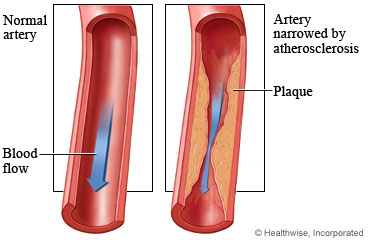Carotid Stenosis: Care Instructions
Overview

Carotid stenosis is narrowing of one or both of the carotid arteries. These arteries take blood from the
heart to the brain. There is one on each side of the neck.
Carotid artery stenosis is caused by a process called hardening of the arteries, or atherosclerosis. A
substance called plaque builds up inside the carotid arteries. Things that can lead to plaque include
diabetes, high blood pressure, high cholesterol, and smoking. This plaque may limit blood flow to your brain.
If plaque breaks open, it may form a blood clot. Or pieces of the plaque may break off. A piece of plaque or a
blood clot could move to the brain, causing a stroke or transient ischemic attack (TIA).
The goal of treatment is to lower your risk of having a stroke or TIA. You can lower your risk by having a
heart-healthy lifestyle and taking medicine. Sometimes a surgery or procedure is also done.
Follow-up care is a key part of your treatment and safety. Be sure to make and go to all
appointments, and call your doctor if you are having problems. It's also a good idea to know your test results
and keep a list of the medicines you take.
How can you care for yourself at home?
-
Take your medicines exactly as prescribed. Call your doctor if you think you are having a problem with
your medicine. You may take medicine to lower your blood pressure, to lower your cholesterol, or to prevent
blood clots.
-
If you take a blood thinner, such as aspirin, be sure to get instructions about how to take your medicine
safely. Blood thinners can cause serious bleeding problems.
-
Try to quit smoking. If you can't quit, cut back as much as you can. People who smoke have a higher chance
of stroke than those who quit. If you need help quitting, talk to your doctor about stop-smoking programs
and medicines. These can increase your chances of quitting for good.
-
Eat heart-healthy foods. These foods include vegetables, fruits, nuts, beans, lean meat, fish, and whole
grains. You limit things that are not so good for your heart, like sodium, alcohol, and sugar.
-
Stay at a weight that's healthy for you. Talk to your doctor if you need help with this.
-
Be active. Ask your doctor what type and level of exercise is safe for you.
-
Limit alcohol to 2 drinks a day for men and 1 drink a day for women. Too much alcohol can cause health
problems.
-
Manage other health problems such as diabetes, high blood pressure, and high cholesterol. If you think you
may have a problem with alcohol or drug use, talk to your doctor.
-
Avoid infections such as COVID-19, colds, and the flu. Get the flu vaccine every year. Get a pneumococcal
vaccine. If you have had one before, ask your doctor whether you need another dose. Stay up to date on your
COVID-19 vaccines.
When should you call for help?
 Call 911
anytime you think you may need emergency care. For example, call if:
Call 911
anytime you think you may need emergency care. For example, call if:
Call your doctor now or seek immediate medical care if:
Watch closely for changes in your health, and be sure to contact your doctor if you have
any problems.
Current as of: June 24, 2023
Content Version: 14.0
Care instructions adapted under license by your
healthcare professional. If you have questions about a medical condition or this instruction, always ask
your healthcare professional. Healthwise, Incorporated disclaims any warranty or liability for your use of
this information.